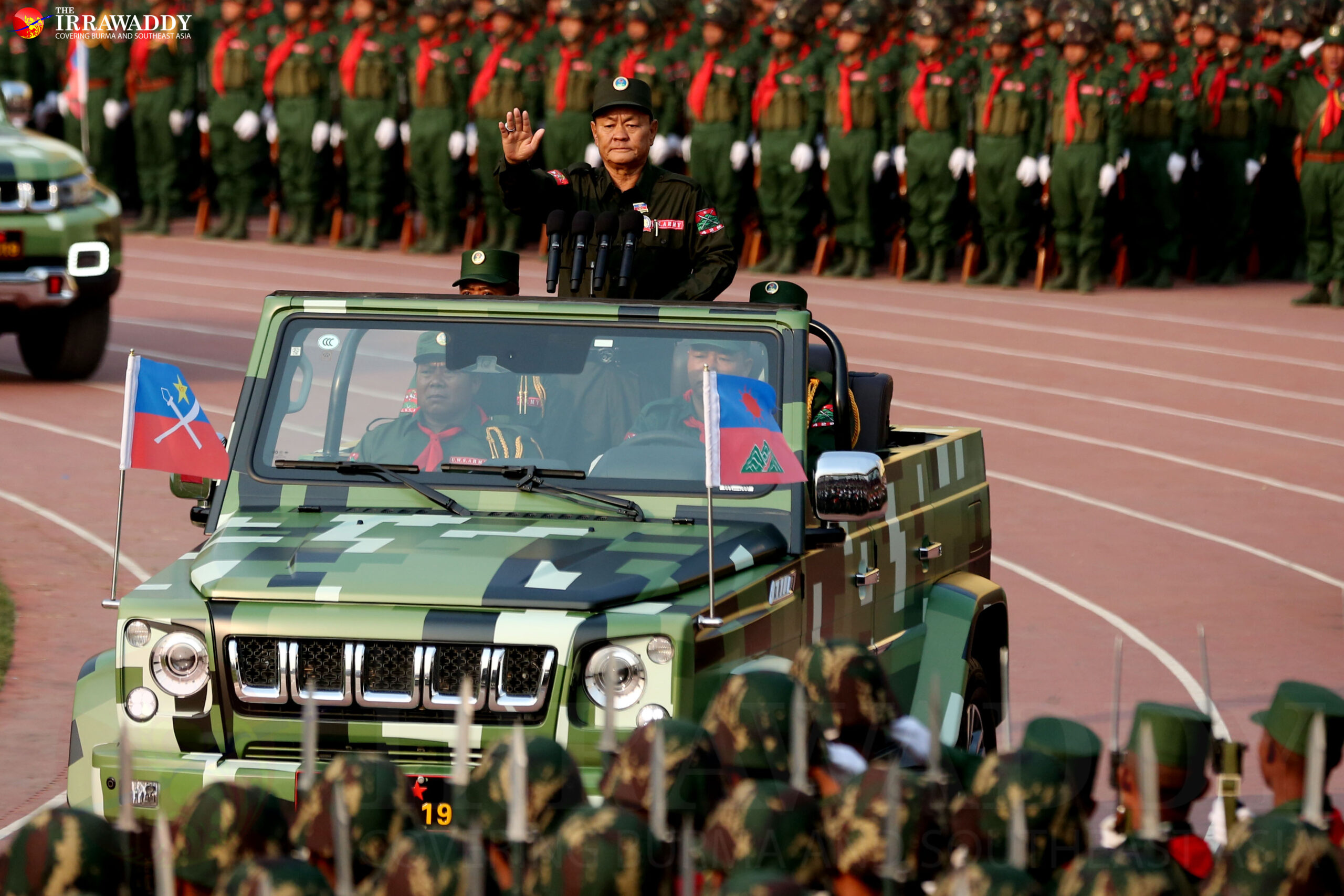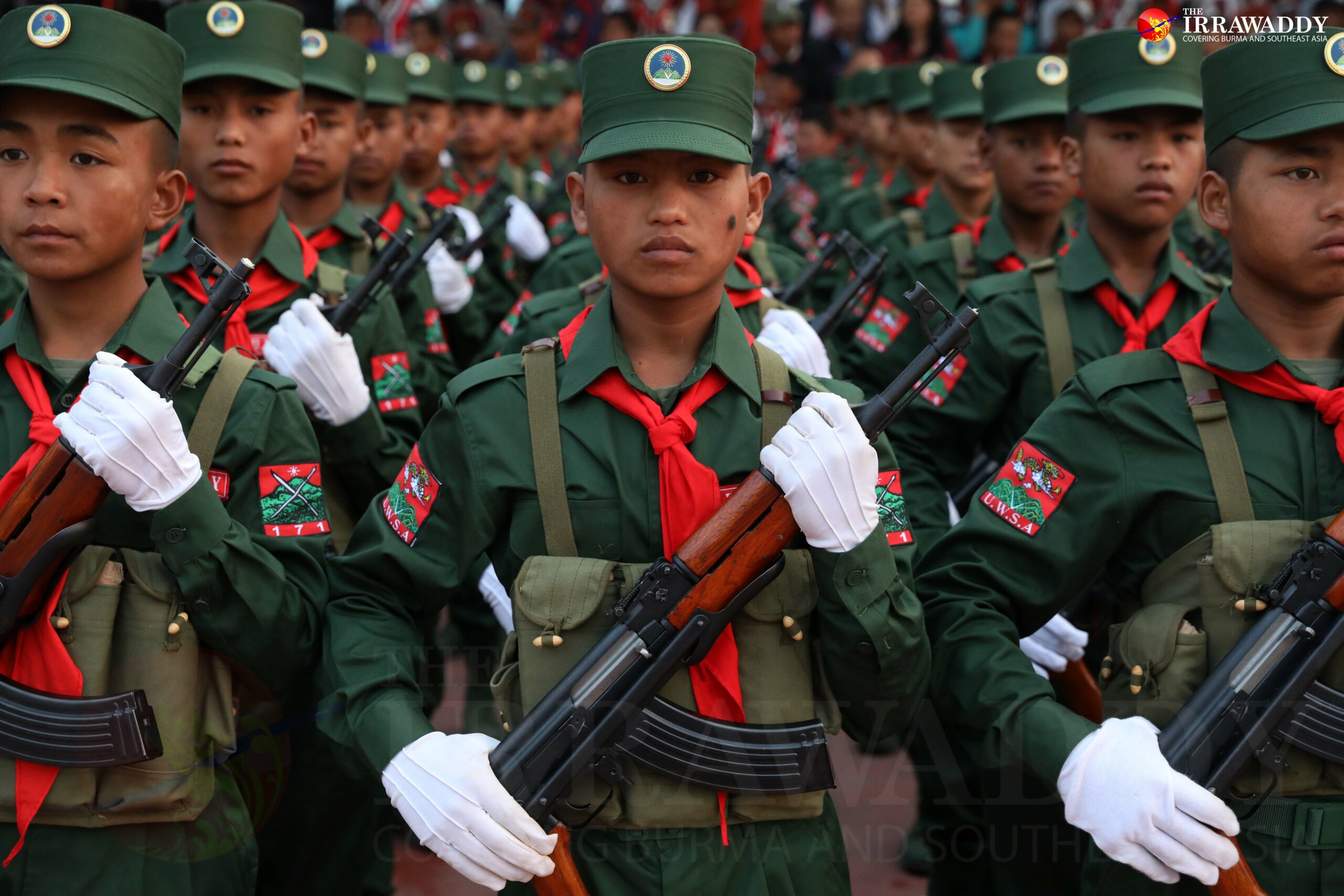PANGHSANG, Wa Self-Administered Zone—Wa leader Bao Youxiang demanded autonomy for his region at a celebration of the United Wa State Army (UWSA)’s 30th anniversary on Wednesday, vowing that ethnic Wa “will fight for their lives” to make it happen.
During his speech at a military parade to mark the anniversary in the Wa capital of Panghsang, on northern Shan State’s border with China, the chairman of the Wa State People’s Government and UWSA commander-in-chief also told 7,600 troops and more than 3,000 guests that Wa state is an inalienable part of the Union of Myanmar, and solemnly promised not to split from it or seek independence.
“What we need is ethnic equality, ethnic dignity, ethnic autonomy, and we ask the government to give the Wa an autonomous ethnic state; then we will fight for our lives,” the Wa leader was quoted as saying in an English translation of his speech provided by the UWSA.
“Until our political demands are realized, we will hold high the banner of peace and democracy on one hand, and armed self-defense on the other, and maintain the status quo,” he added.
Founded on April 17, 1989, the UWSA signed a ceasefire with Myanmar’s then military government—the State Law and Order Restoration Council—in the same year after splitting from the Communist Party of Burma. It also founded the United Wa State Party and the Wa State People’s Government. Since then the UWSA has quietly grown into the largest, best-equipped ethnic armed group in Myanmar with an estimated 30,000 troops and 10,000 auxiliary members, according to Myanmar Peace Monitor.
Since the ceasefire deal in 1989, there have been no clashes between the UWSA and the Myanmar military (or Tatmadaw). The Wa army has demanded autonomy, like other ethnic armed groups in Myanmar. Myanmar’s 2008 Constitution acknowledges the Wa areas in Shan State as a self-administered region.

The UWSA has not yet signed the government’s Nationwide Ceasefire Agreement (NCA). The group serves as the chair of the Federal Political Negotiation and Consultative Committee (FPNCC) alliance, some of whose members are still fighting the Myanmar Army.
The government has pressured the UWSA to sign the NCA, but it and other members of the FPNCC want the government to amend some parts of the agreement first.
On Wednesday the UWSA celebrated on a grand scale in Panghsang’s People’s Square. Bao Youxiang waved while inspecting his troops from the back of a jeep, à la Chinese President Xi Jinping. In front of the visitors, who included representatives of the Myanmar government, Wa troops showed off some of their military hardware including drones and anti-aircraft missiles. But some Wa sources and military analysts with knowledge of the Wa’s weaponry said that despite earlier speculation that it would use the occasion for a grand display of its arsenal, the UWSA appeared to have decided to tone things down this time, perhaps to avoid embarrassing the Myanmar military. The Wa apparently chose not to show off the weapons and missiles it is known to have bought from China recently, possibly so as not to give the Tatmadaw too accurate a picture of its strength. Observers and journalists are forbidden to visit Wa troop encampments and military bases where the group’s latest shopping items are stored.
Myanmar State Counselor Daw Aung San Suu Kyi was absent from the ceremony, but sent a message to the event. In it, she urged the Wa to join the NCA, saying the agreement is just a threshold to pass though on the way to a democratic federal union that grants equality and self-determination for all ethnic people.
“I solemnly remind you that if there are other issues not covered in the NCA, you could deal with the government after signing the agreement,” she said.
The Wa leadership did not officially comment on the State Counselor’s message, but some high-ranking UWSA officials expressed a desire to see a tripartite meeting on the issue between Daw Aung San Suu Kyi, Myanmar military chief Senior-General Min Aung Hlaing and Wa leader Bao Youxiang.
Wa leaders were disappointed that the State Counselor did not attend the event. They quietly complained to ethnic delegates that the government sent only mid-ranking officials—despite the presence of U Thein Zaw, vice chair of the government’s Peace Commission and U Thein Swe, the Union minister for Labor, Immigration and Population—and that the Myanmar Army was only represented by officers at the rank of colonel. U Thein Zaw and U Thein Swe are also both members of the Union Peace Dialogue Joint Committee.

Chinese Special Envoy for Asian Affairs Sun Guoxiang, who attended the anniversary celebration, did not make any comment at the event. It is believed that during Sen-Gen. Min Aung Hlaing’s recent visit to Beijing, China asked him to extend the Tatmadaw’s unilateral four-month ceasefire period. The military announced the ceasefire in December. During the senior general’s visit, the two sides discussed several issues including the peace process in northern Myanmar and the crisis in Rakhine State.
Among those who declined personal invitations to attend the UWSA celebration was former Myanmar military spy chief General Khin Nyunt. Dubbed the “Prince of Evil” for his atrocities against democracy and student activists after the ’88 Popular Uprising, the former Military Intelligence chief masterminded the ceasefire deal between the then military regime and the Wa in August 1989. Despite being ousted from his position in 2004, U Khin Nyunt made a lasting impression on the Wa. When an ethnic festival was held in Yangon in January this year, Wa representatives paid him a visit, relaying a message from their leaders that he was missed by them, and taking pictures with him.
In a message to the UWSA event on Wednesday, the former general said he was proud to have received an official, verbal invitation and apologized for his absence, which he attributed to various reasons that prevented him from attending, despite his willingness. He said that while he hadn’t made it to the Wa region since 2004, he was very glad to learn that development had progressed in the area.
“I will never forget what U Bao Youxiang said about non-secession from the Union, his standing with the military government on political issues, and his collaborations for regional development, anti-narcotics campaigns and border stability,” U Khin Nyunt said.
















